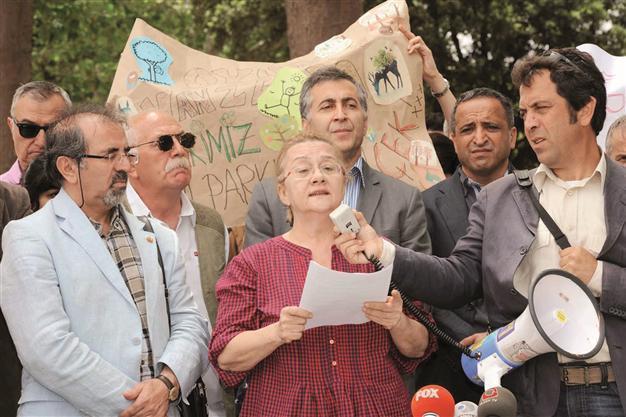Turkey stages 'show trial' of Taksim Solidarity Platform members for 'organizing' Gezi protests
ISTANBUL - Agence France-Presse

Mücella Yapıcı of Taksim Solidarity group makes a press statement.
Turkey on June 12 held the first hearing in the trial of more than 26 members of the Taksim Solidarity Platform, a process Amnesty International denounced as a "show trial."
The accused members of the umbrella group, including doctors, architects and engineers, face lengthy prison terms for their part in leading the protests a year ago, with the prosecutor calling for 13-year jail terms for the five main suspects.
The charges include founding a criminal syndicate, violating public order and organising illegal protests through social media. Last year's protests began as a small environmental movement to stop the redevelopment of the city's Gezi Park and quickly blew up into wider nationwide demonstrations against the perceived authoritarianism of Prime Minister Recep Tayyip Erdoğan.
"You cannot found a criminal organisation by saying 'I don't want a shopping mall'. It is a very ridiculous charge," one of the key accused, Mücella Yapıcı, head of the Istanbul chamber of architects, told the court.
The hearing concluded on June 12, with the next one scheduled for October 21.
"They have submitted as evidence a picture of me shouting for help while police fired tear gas in my face," Yapıcı said in a speech that drew cheers from those in court. "We started a resistance which was exemplary to the world, which was very peaceful.
"But we faced increasing violence each time we took the streets. I was gassed from a very short distance and my friends who were defending me were badly injured after the police attacked."
Another defendant, Beyza Metin, the head of Istanbul chamber of electrical engineers, also questioned the charges. "It is not possible for five people to lead demonstrations which took place across the country and were attended by millions of people," she said.
Judiciary under teh sway of gov'tOutside the court, a crowd waved banners in support of the defendants. Amnesty International urged the Turkish authorities to abandon what it called "a vindictive, politically motivated show trial without a shred of evidence of actual crimes."
"The prosecution has concocted a case simply to send a strong message to the rest of Turkey that the authorities will ruthlessly pursue anyone who dissents and organises protests against government policies."
Turgut Kazan, the lawyer for Yapıcı and six others on trial, said during the hearing: "I am really ashamed that such a trial has begun in my country."
"A state of law cannot treat different people differently, but the judiciary is under the sway of the government and it is doing what the government says," he added. The Taksim Solidarity group was formed in 2012 after the government announced plans to redevelop Gezi Park, one of the last remaining green spaces in central Istanbul, and neighbouring Taksim Square, the country's symbolic rallying point.
The group met Erdoğan at the height of the unrest to discuss the protesters' demands, only to be accused by the premier of being "traitors" aiming to destabilise the government.
Also among the defendants on Thursday was Ali Çerkezoğlu, the secretary general of the Istanbul Medical Chamber, who treated several wounded protesters.
In January, Turkey passed a new law making it a crime for doctors to provide emergency first aid without a permit, which critics said was an attempt to block doctors from treating protesters. "The only aim of this trial is to discredit the protest movement by making people believe that there was a crime organisation. But it has no legal basis," he said.
"Those being tried here are the ones who dealt a big blow to Erdoğan's charisma and leadership." Several trials related to the protests are already taking place across the country, but Thursday's trial has the highest profile.
"The only goal of this case is to scare people," said Baki Boğa, of the Human Rights Association Turkey. "They want to show that anyone, regardless of their age, profession or background, can be prosecuted for being a protester." "This is a politically motivated case aimed at completely wiping out the dissenting voices in Turkey."
The government did not go ahead with the plans to demolish the park, but the entire Taksim area has become a site of frequent clashes between police and protesters. Dozens were beaten by the police on the anniversary of last year's protest on May 31.
